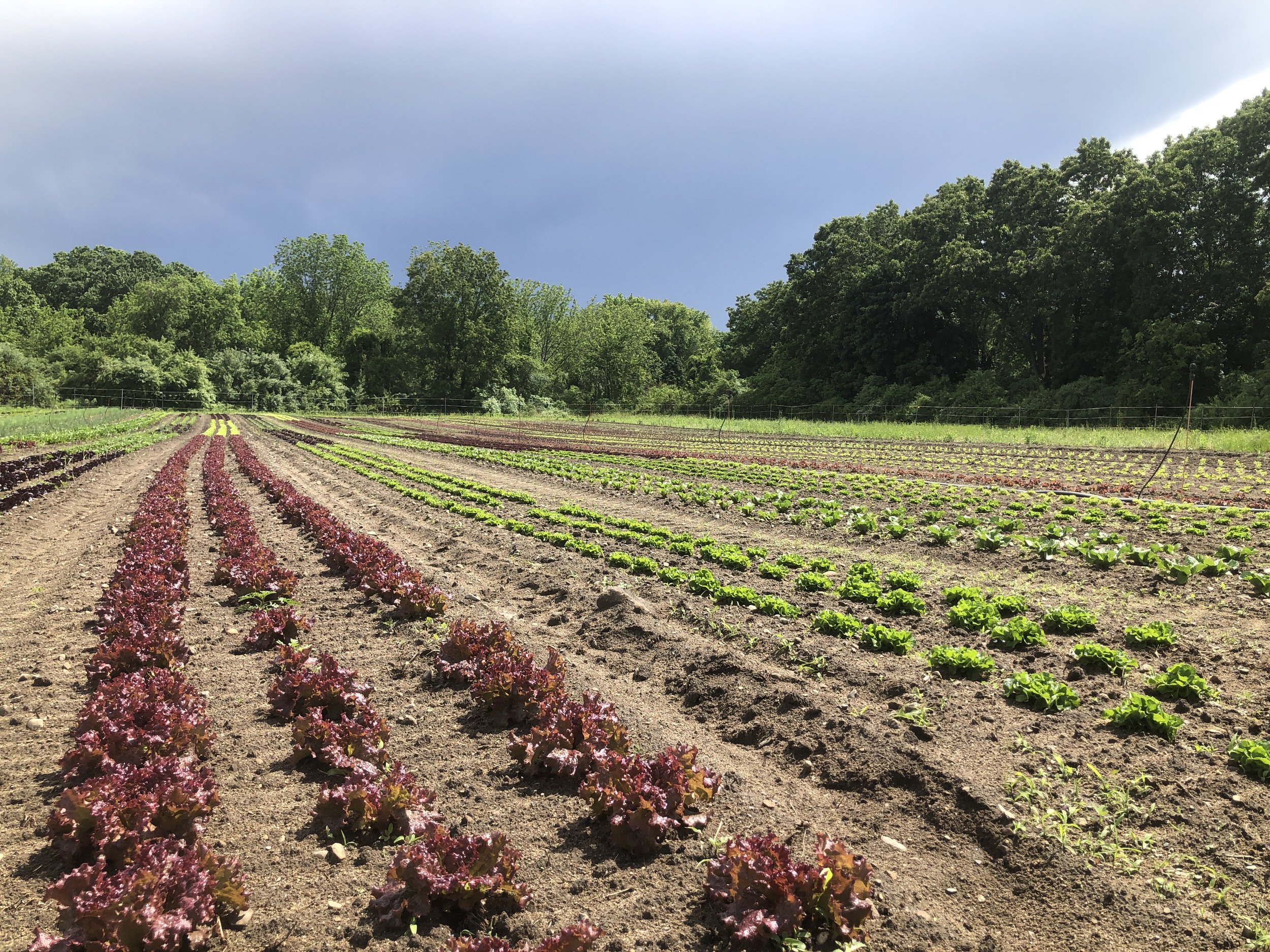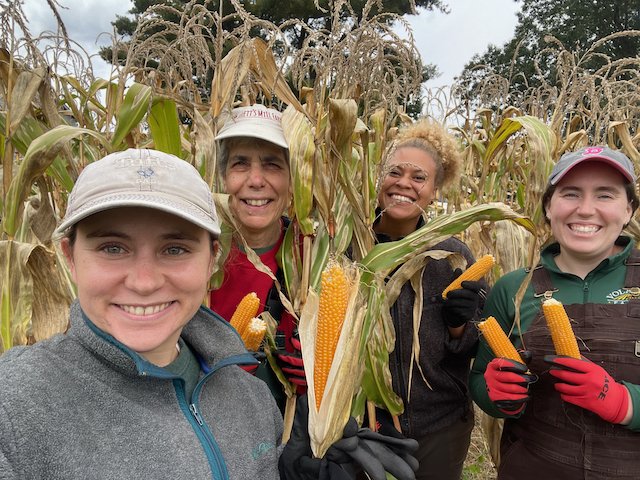One of the most frequent assumptions we encounter about farm work is that farmers take the winter off. While our schedules are a bit more forgiving in the winter months, it is actually still a busy time during which we reflect and plan for the following season. Deciding how we are going to adjust practices and build on past successes feels like trying to solve a challenging (but satisfying) puzzle. However, in the past several years, the puzzle has become increasingly complex and required bigger adjustments to our operations. The pandemic obviously brought some big changes, but climate change, soil-based limitations and some harsh fiscal realities are increasingly forcing us to look at more dramatic changes to stay afloat.
Climate Change: Lately, weather has swung back and forth between drought and too much rain. Drought years have meant hundreds of hours of additional labor setting up and running irrigation. Even with this extra effort, we don’t have an unlimited capacity to irrigate, so we still see crop and yield losses. In extremely wet years like 2021 and 2023, we see flooding in fields, intense rain storms damaging and washing away entire plantings, increased disease pressure, nutrient leeching and stunted plants. Wind-related events have also caused damage, but not yet to the degree of precipitation-related extremes.
Soil Health: In addition to weather-related challenges, we have also found ourselves hitting up against the limits of improving our soil health. We often joke that we farm on a beach, as the soil is so sandy and lacking in organic matter and vital nutrients. Cover cropping is one of the most tried and true methods to improve or maintain soil health. We maximize the areas that we cover crop crop each year, which has prevented the soil from deteriorating, but it still hasn’t generally improved it. We do see some minor improvements when we cover crop and leave fallow areas for a full season or two, but that’s a challenge to carry out. It’s a bit of a catch-22: we need to use more growing space to produce enough food on marginal land, but in order to make the land slightly less marginal, we need to grow on less space!
Finances: Farming is always fiscally challenging in even the best of circumstances. Food is an essential, and there is an expectation that it will be cheap. However, the cost of growing food, particularly on small diversified farms like ours, is not cheap. We are not heavily mechanized like larger conventional farms, so labor is the majority of our expenses. Labor costs have rapidly risen as we try to keep up with the cost of living for our employees. We are paying workers 50%-100% more than we paid when we first started out here 10 years ago, but it is still not enough for most people to afford living within commuting distance of the farm. While supply costs are no longer increasing quite as dramatically as they were a year ago, they haven’t come down either. Selling enough produce to offset rising costs has been challenging. There was a peak of interest in local farms in the first 2 years of the pandemic, but we (and other farms in town), have seen that interest dropping off. We are all finding ourselves increasingly competing with grocery store prices and convenience. The upshot is that while the prices we charge have gone up, we are paying ourselves less.
In order to address these challenges, we are making several bigger picture changes on the farm:
Decreasing the amount of land we grow on to keep more land fallow. The more space we can leave fallow over multiple seasons, the better for soil health. We already cut back a little when we decreased the CSA size, but we’d like to do more. Many of the adjustments listed below, including increasing high tunnel production and cutting back on space inefficient crops, will help with this goal.
Maximizing high tunnel production. The protected growing space afforded by our high tunnels has really saved us in the past three seasons. We are less subject to weather extremes, and the passive solar heat gives us earlier and more prolonged harvests with higher yields in a smaller space. This year we are working on ways to turn around crops more quickly so that we can continuously harvest greens in the winter instead of waiting until March or April.
Transplanting more crops to give plants a jump start in a more controlled environment. Transplanting is more labor intensive than direct seeding, but with many crops, it is also more likely to lead to better and quicker yields. We have invested in a paper pot transplanter (a small tool that one person can pull through the soil to rapidly plant small seedlings) that should make it less daunting to transplant closely spaced crops like spinach. This is also an important part of our plan for more quickly turning around high tunnel growing space.
Buying in some locally grown crops that we have a hard time growing or that are space inefficient. We devote a lot of resources to some crops (like potatoes and fall beets) during critical times in the season when we could be allocating our time more effectively elsewhere. Other crops like butternut squash don’t take up a lot of our time, but they are space hogs, which is not ideal when you are trying to leave more land fallow! We are still growing some quantities of these crops ourselves, just less of them. We are committed to buying organic whenever possible and as locally as possible (the farms we work with currently are under 2 hours away from us).
Increasing seedling sales. There has been a lot of interest in plant starts, so we are expanding the types of herbs, peppers and tomatoes we’ll offer, as well as adding kale, cucumbers, summer squash, zucchini, and some flowers. Given the controlled environment of the greenhouse, seedling production is far less subject to the problem of weather extremes.
Expanding flower varieties we grow for bouquets in the farm stand. We are trying out growing dahlias, delphiniums, eucalyptus and some new varieties of overwintered snapdragons for the single-type and mixed bouquets we sell in the farm stand. We are also planning to add more narcissus varieties, as well as possibly establishing some peonies. In the future, depending on how things go, we may add a spring flower CSA.
Improving our pest exclusion plan. The amount of lettuce we lost to deer in 2023 was devastating, as entire plantings were wiped out. Deer also grazed on bean plantings and sweet potato vines, reducing yields. Mice and rabbits always take a toll on our high tunnel-grown crops. We also suffered big losses in our colored peppers due to pepper maggots in July and August in 2022 and 2023. We have plans for putting up barriers and netting in the high tunnels, and we are looking at ways we can enhance our existing deer fencing.
Moving towards a scale and systems that are less labor-intensive. We are still going to have employees, but we are aiming to keep improving efficiency and be a little less dependent on outside labor given rising costs and the tight labor market. We have been so fortunate to have some fantastic employees who have stuck with us for multiple seasons, but we know that we won’t always be so lucky! Our goal is to pay the employees we do have (as well as ourselves!) a fair living wage.
Diversifying our farm stand offerings with value-added products and new local products. We are working with a local kitchen this year to produce some hot sauce (and possibly also salsa verde) from ingredients grown on our farm. These shelf-stable products extend the amount of time we have to sell our produce - hot sauce is good for years, but hot peppers are only good for about a week once they’ve been harvested! We are also working to have some new local and New England-grown shelf-stable products available in our farm stand, like dried beans, flour and maple syrup.
Buying in more compost to improve soil health and yields. Cover cropping alone has not been enough to improve soil health. In the absence of the ability to produce our own compost (largely from the lack of space far enough from the river to carry out composting), we began to buy in leaf compost to spread in our fields starting in 2022. Compost is a huge expenditure - we have been stretching our budget to buy in one truckload of leaf compost per season, which is only enough to cover about 1 acre. Even so, we are planning to buy larger quantities of compost this year and to spread some in our high tunnels in addition to the field. We are hoping to use compost that is richer in organic matter than leaf compost, but we know that will be significantly more expensive.
We are facing a lot of challenges, and while it can feel pretty overwhelming, we also see reasons to be cautiously hopeful. There are always inspiring new ideas to learn from and new techniques to try out. We may not be able to make farming very profitable, but we do feel that there is value in what small local farmers do - both for our ecosystem and for our community - and we hope others do to!





